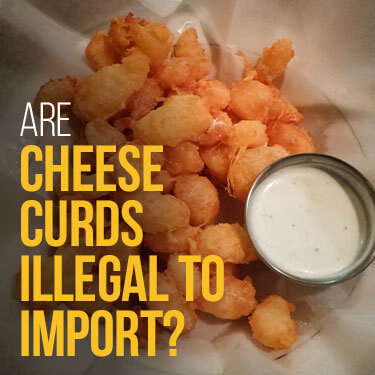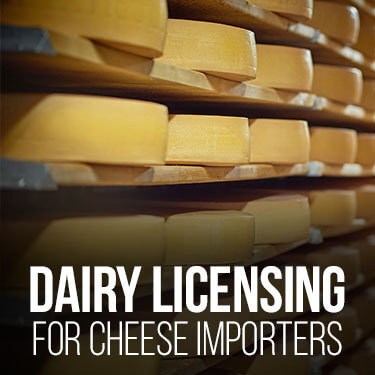Have you been thinking about how to import cheese to USA for your next business venture? Want to surprise a friend or family member whose smelly cheese obsession and charcuterie boards dominate on TikTok? Learn some of the necessary requirements for importing cheese for both profit and fun - but hopefully both.
The Food and Drug Administration (FDA) has strict regulations on importing cheese. Both the ingredients and the methods by which cheese is processed will determine whether it is legal for import. A number of cheeses are also subject to tariff-rate quotas which limit the import quantities based on type and nation of origin.
Find out which cheeses make the most popular imports and how to obtain the necessary documentation to bring them into the United States.
Considering the United States produces significant amounts of its own cheese and is actually one of the top ten cheese exporters, it seems unlikely there would ever be a queso emergency requiring major imports. On the other hand, Americans have been getting a taste for many traditional kinds of cheese produced in Europe, Mexico, and South America.
All food (including cheese) that is imported into the U.S. must meet FDA health and safety standards. If you are importing commercially, there are some additional requirements that must be met.
Aside from the FDA, the U.S. Department of Agriculture (USDA) also issues permits for some cheese products depending on the country of origin. FDA and USDA regulations are enforced at the moment of import by U.S. Customs and Border Protection (CBP) services.
Depending on where your cheese is coming from and under what conditions, your shipments may automatically get flagged based on HTS code alone. It can’t be stressed enough that if you do not have the correct documentation at the moment your imported products arrive, there is a high possibility of rejection - and all the penalty fees that come with it.
Common requirements include:
Cheese comes in a variety of packaging, with some being more likely to spoil than others. Refrigeration requirements, shelf-stability, and the presence of additional ingredients like meat make a difference in the import process.

Our 45 Minute Licensed Expert Consulting Will Personally Guide You.
In 2020 the U.S. imported about $1.26 billion worth of cheese and cheese products. The most consumed types of cheese are also the most frequently imported; topping that list is Cheddar. While there are many equivalent styles made in the U.S., many who think of themselves as true cheese connoisseurs won’t settle for less than the original.
| Type of Cheese | Number of Consumers (in millions) |
| Cheddar | 141.54 |
| Mozzarella | 97.54 |
| Parmesan/Romano | 62.51 |
| Swiss | 59.87 |
| Provolone | 46.35 |
| Feta | 32.55 |
| Gouda | 28.46 |

Of course, this list is focused on some of the common mass-produced cheese that can be bought at a local grocery store. Many come from Italy, the nation where the U.S. imports some of its favorite specialty cheeses as well.
Common Italian Specialty cheeses include:
For those who wish to focus on specialty cheeses, it's good to get an idea of the local taste preferences if you are importing to a brick-and-mortar store.
Many cheese shops are now offering to ship or are even establishing themselves entirely online to be better able to reach multiple markets across the U.S.
If this sounds more familiar to you, consider some of the specialty cheeses that can be imported from around the world. While European cheese does tend to dominate the specialty import market, cheese from nations such as Mexico, Australia, and Argentina has slowly been making its way in with great success.
Consider some of these examples:
The trick to successfully importing these, or other types of specialty cheese, is to find a supplier that will produce them with pasteurized milk products. If it is a product made with raw, or unpasteurized cheese, it must be a hard cheese.
Soft or liquid cheese made from raw cow’s milk or other milk-producing animal is banned from importing into the U.S. by the FDA.
Although these limitations sometimes annoy cheese fanciers, the FDA has the data to back up the potential harm caused to individuals by consuming products made with raw milk products.
Other cheeses deemed unfit for entry into the U.S. are those aged or fermented with certain types of bacteria or insects. You read right - one of the most famously illegal cheeses is Casu Marzu which is aged in such a way as to encourage maggots to infest the cheese.

For starters, the term cheese curd is something of a misnomer since curds are technically a by-product of the cheese-making process. Curds are simply bits of curdled milk left unpressed when making cheddar or Colby cheese and often eaten soon after.
Left alone for a short time, they are bits of very young cheese that can be served in a variety of ways. If cheese curds are made with pasteurized milk, they are perfectly legal to import into the U.S. The other option is to leave them to age for at least 60 days.
However, hard cheeses are often started with unpasteurized milk. This is acceptable because the heating process of making the cheddar cheese will kill off harmful bacteria anyways. Such is the practice in Canada, the only place where someone might consider importing cheese curds.
Cheese curds are only good for a few days after being made but can be sealed and packaged for mass distribution. They just aren’t likely to have the fresh “squeak” they are often characterized by.
Importers of food and food products close to the northern border may be able to bring in cheese curds as an import, but considering the limited shelf life - it generally isn’t very profitable. It would also be competing directly with the state of Wisconsin’s famous cheese curd production.
To clarify, yes, cheese is a dairy product because it’s made using milk. Any product made from milk, regardless of the animal that produced the milk, is classified as dairy.
The fact that milk is a dairy product is what makes importing it difficult at times. The U.S. has a thriving dairy industry and imported dairy products have sometimes been viewed as a threat to that industry.
For more detailed import information, see our article on importing dairy products into the US.
The need for a USDA APHIS permit will depend on the type, content, and origin of the cheese you are importing. While there are some cheese varieties that can be imported into the U.S. without a permit, there may be other documents required instead.
There are some basic guidelines you can follow until getting official confirmation from a customs broker.
These are just a handful of the basics. Many imports have various exceptions that can only be determined by working with a customs broker. For instance, when importing cheese with meat, the origin and type must be considered. Much like dairy products from countries affected by FMD are highly regulated, any diseases that could potentially affect meat and in turn affect production, are closely monitored.
FSIS is there to ensure that all food, regardless of origin, meets domestic health and safety standards for human consumption.
It is highly recommended that you speak with an experienced customs consultant for all import documentation needs. With their industry experience, they will provide you with the answer or find someone that can come up with the answer. A customs broker will also be able to ensure that all documents are in order when your shipment arrives at the port of entry.

If you plan on importing cheese on a regular basis, or more than four times a year, you should consider obtaining a dairy import license.
Dairy import licensing is managed by the USDA’s Foreign Agricultural Service (FAS) to allow imposters to bring in certain tariff-rate quota (TRQ) products at a lower rate.
Cheese that is subject to a TRQ has a low and high rate import duty attached to it. Only importers with a license can qualify for the low rate. This means that a dairy license is not required to import TRQ cheese, but it can be the difference between making a profit or not.
The different types of cheese covered by a dairy import license include:
Because of the “other” category, it truly is necessary to speak with a customs expert. Different specific cheeses can fit within each category. Basically, anything that fits the description of a cheddar based on production, taste, or other, would be in that category. A dairy license is issued with specific conditions for that reason.
Under each category, there is a limit to how much of an overall type can be imported and a separate limit detailing how much can be imported from a specific place. Take Edam and Gouda cheese as an example. The total annual import limit is 6,816,402 kilograms. That amount is further divided by country.
| Country of Origin | Quantity (Kilograms) |
| Argentina | 235,000 |
| European Union (any of the 27 member nations) | 6,389,000 |
| Norway | 167,000 |
| Other (varies by permit) | 25,402 |
A dairy license will be specific to a single type and importer, and it will contain a quota for how much of the cheese is allowed. The numbers in the chart above represent the total allowed for the year. It would be further divided among various importers.
There may be 10 different licenses issued to individuals who want to import cheese from Norway, and each one may have a different limit. Licenses are good for one year and to be eligible for renewal, you must import at least 85% of your assigned quota, among other stipulations.
A customs broker will be in the best position to help you obtain a dairy license if you feel it will benefit your import business. If you aren’t sure, consult with a licensed and experienced broker to determine if such a move is needed based on your import business model.

Our 45 Minute Licensed Expert Consulting Will Personally Guide You.
Get the tools you need to learn how to import cheese to USA hassle-free and make your charcuterie board business the envy of the town. USA Customs Clearance has experts to guide you from start to finish and make sure your products enter the port with all the needed documents.
Need the perfect pairing of wine or fruit to go with your awesome cheese selection? USA Customs Clearance can also help you with importing alcohol or fresh fruit from around the world.
Get assistance with all your import needs.
If you are new to importing, check out our new importer bundles that get you on track and save you money.
Call us today and speak with a customs consultant. In less than an hour, you could be on your way to a better and smoother import experience.
 Copy URL to Clipboard
Copy URL to Clipboard
Add your first comment to this post